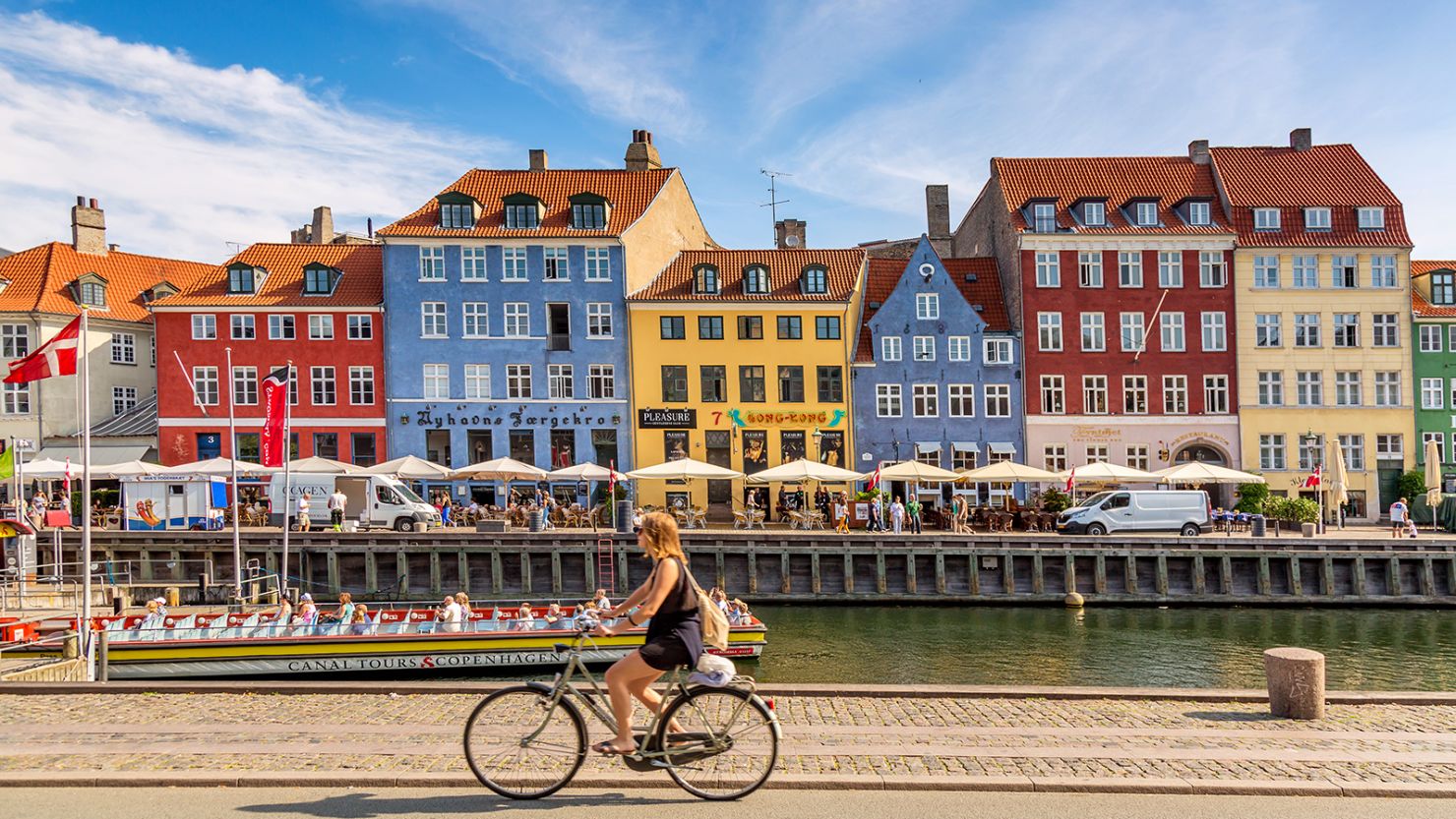Editor’s Note: Monthly Ticket is a CNN Travel series that spotlights some of the most fascinating topics in the travel world. In February, we’re exploring the people, places and journeys working to make tourism more sustainable.
Bicycles can be a great way for travelers to enjoy a city. Not only do you have easy access to many tourist spots, but they’re good for your personal health, financial health and the planet’s health.
However, not all cities are bicycle friendly. The last thing you want is a stressful vacation pedaling around an urban tangle where roads and vehicles totally rule.
The good news is some cities have given bicycles and the practice of sustainability their due.
The following 10 cities worldwide are among the best for tourists (and locals) who like to bike.
Antwerp, Belgium
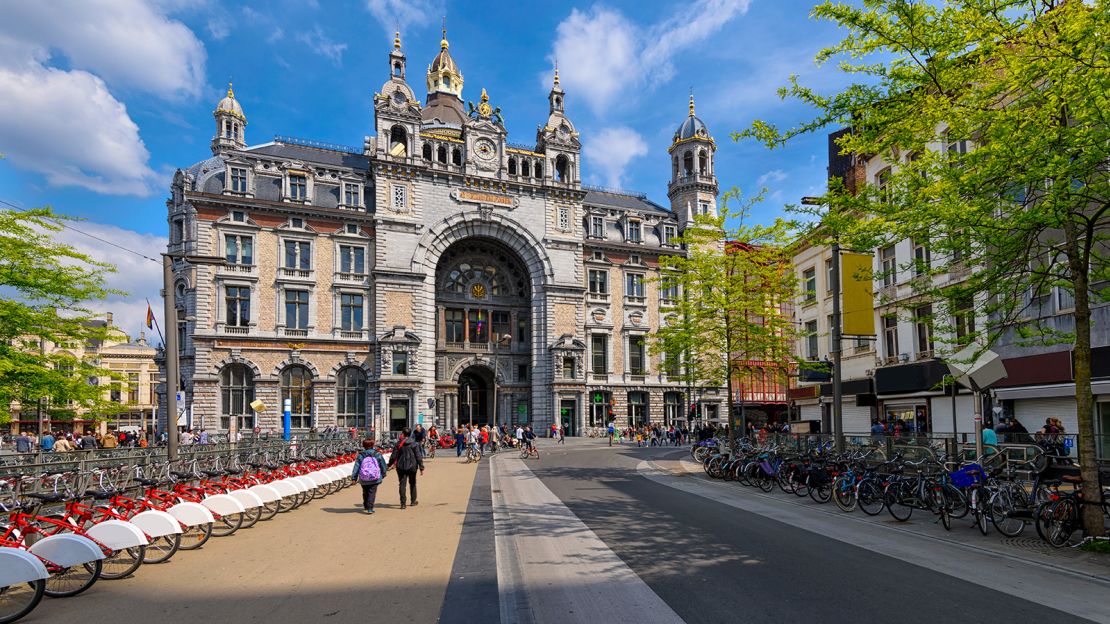
There’s nothing like a local to help provide the lay of the land. Jurga Rubinovaite, founder of the Full Suitcase family travel blog, is based in Antwerp. And she’s also a major biking enthusiast.
“Biking is a great way to explore a new destination or rediscover a place and get to know it deeper,” she told CNN Travel by email. “So I try to do it whenever I get the chance.”
Antwerp ranks No. 3 on the latest Global Bicycle Cities Index, and it’s also high in Rubinovaite’s estimation.
“It offers a great mix of historic landmarks, modern architecture, world-class museums, and some of the best shopping and dining in Europe,” she said. “In addition, it’s a relatively flat and bike-friendly city, which is surrounded by lots of greenery, just a stone’s throw from the historic old town.”
Among her tips: “If you are short on time, I highly recommend biking next to the river to the Eilandje district, just north of the old town. Some of the highlights here include the MAS Museum, the Port House of Antwerp, the Red Star Line Museum and the Park Bridge.”
While Antwerp is a year-round destination, she suggests coming from April to October for the best biking weather.
Click here for bike rental options.
Bern, Switzerland
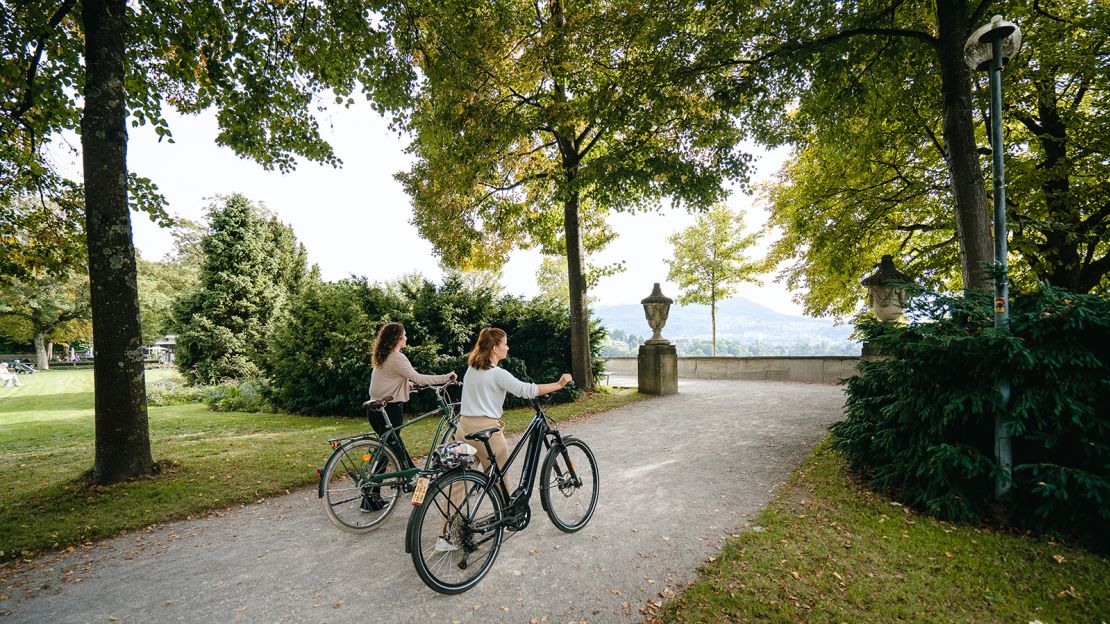
It’s a capital idea to see this nation’s lovely capital by bike. There are routes to fit any fitness level or sightseeing interest.
The City of Bern route takes you through neighborhoods such as Kirchenfeld (the museum district). It’s 15 kilometers (9.3 miles) with about a 200-meter (656-foot) change in elevation along the route.
The UNESCO Tour route starts in Bern’s Old Town and leads to the Rose Garden, a popular selfie spot with a breathtaking view. It also goes by the Bern Cathedral and the city’s mountain, the Gurten, before heading out to more rural settings. It’s 60 kilometers (37 miles) with designated “easy” riding conditions.
For thrill-seekers who feel the need for speed, there’s the downhill trail at the Gurten. Riders take a funicular to the top before beginning their rapid descent.
Bern has rentals in every category: e-bikes, mountain bikes and more.
Copenhagen, Denmark
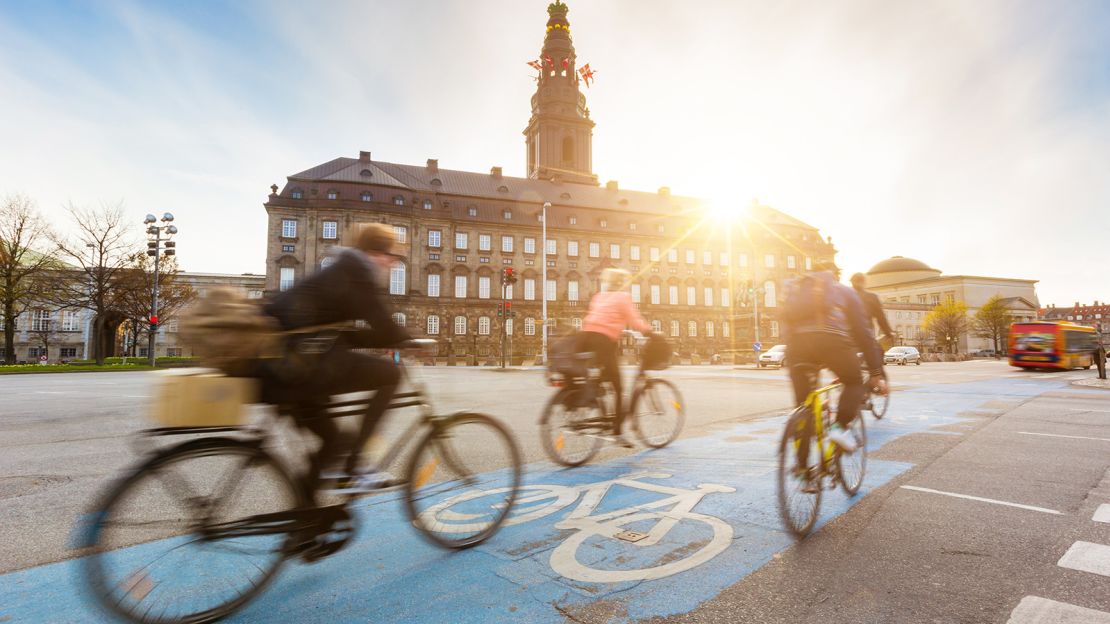
The Danes are known for taking their bicycling culture seriously, and the stats back that up. Roughly 70% own a bike, according to the Danish Centre of Cycling Knowledge, and about 45% of commutes in the Copenhagen area are by bike.
The first bike lane in Denmark was set up in 1892 in Copenhagen. Today, the capital has 385 kilometers (239 miles) of bike lanes, according to VisitDenmark.com. Bicyclists and drivers also safely share the same roadway in many places. Thanks to Danish design innovations such as narrowed streets and textured surfaces, cars drive slower.
Tourists can get in on the pedaling action for general transport or with themed routes.
For folks who love design, there’s a 22-kilometer (16.7-mile) route that covers the buildings of innovative architect Bjarke Ingels. The Harbour Circle route offers 13 kilometers (21 miles) of waterside sites. Famous Tivoli Gardens is an easy ride from the center of the city, but you’ll have to put it in a bike rack before entering the park.
Click here for a list of bike rentals, and then click here for the city’s biking rules. A bonus for tourists not in tiptop shape: Copenhagen is mostly flat.
Leipzig, Germany
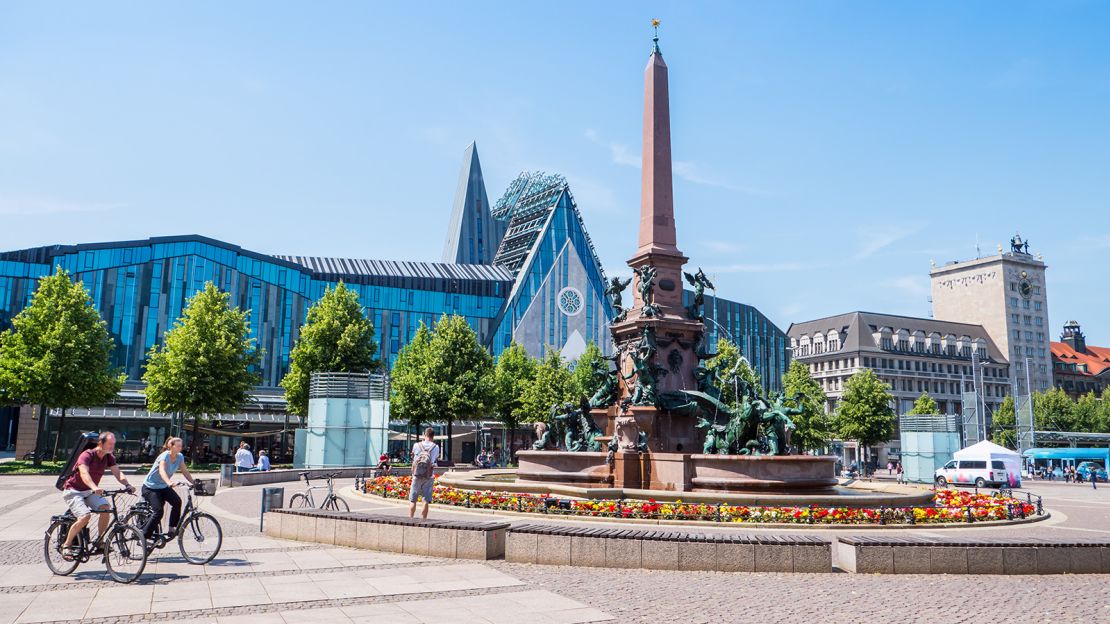
Numerous German cities claim enviable spots on the Global Bicycle Cities Index, and longtime cultural juggernaut Leipzig is one of them.
Roughly 185 kilometers (115 miles) southwest of Berlin, Leipzig was the longtime home of Baroque composer Johann Sebastian Bach. It’s also home to an impressive biking system on a serious growth spurt.
In 1990, Leipzig had 70 kilometers (43.5 miles) of bike paths. Today, there are more than 400 kilometers (almost 250 miles) of paths, according to the city government. Cycling is generally permitted in green spaces and in the city’s parks.
Travelers can bike to and park right across from top sites such as St. Nicolas Church, a center point of history ranging from Bach in 1723 to the 1989 revolution in then-East Germany. Lovers of classical composers might want to shell out the euros for a three-hour tour of historical music sites.
The city features hilly and flat routes, and Nextbike is a ubiquitous rental option.
Melbourne, Australia
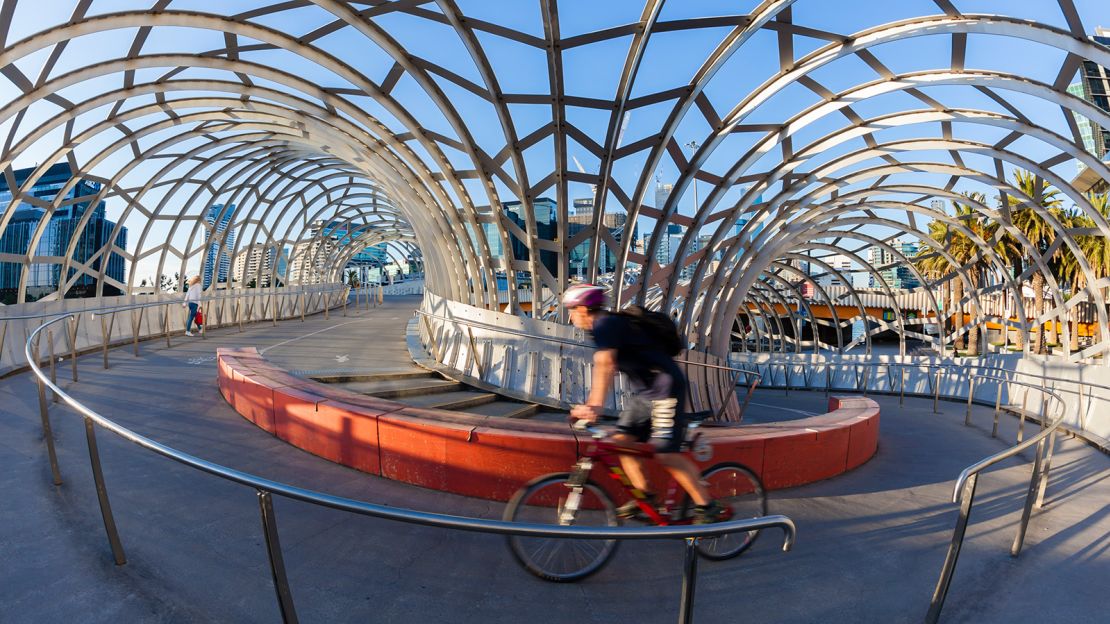
Melbourne’s scenic beauty, culture spots and casual eateries are that much more fun when you arrive by bike.
The city has more than 135 kilometers (84 miles) of on- and off-road routes and is fast-tracking more.
One riding highlight is the Capital City Trail. Cyclists share its 29 kilometers (18 miles) with pedestrians. It circles the inner city and goes through some eastern and northern suburbs.
Waterways and bike paths just seem to go together, and so it is in Melbourne.
The Maribyrnong River Trail has an easy/moderate grade and takes riders past the Flemington Racecourse, a major horse racing venue, as well as Pipemakers Park, where visitors can explore the historic buildings and wetlands. Folks who aren’t too tired can take on a steep climb to the scenic lookout at Lily Street.
The Main Yarra Trail offers up to 33 kilometers (20.5 miles) of great river views and takes riders to the bustling CBD.
Bike helmets are mandatory in Melbourne. Click here to learn more about the city’s bike-sharing app and get general advice.
Montreal, Canada
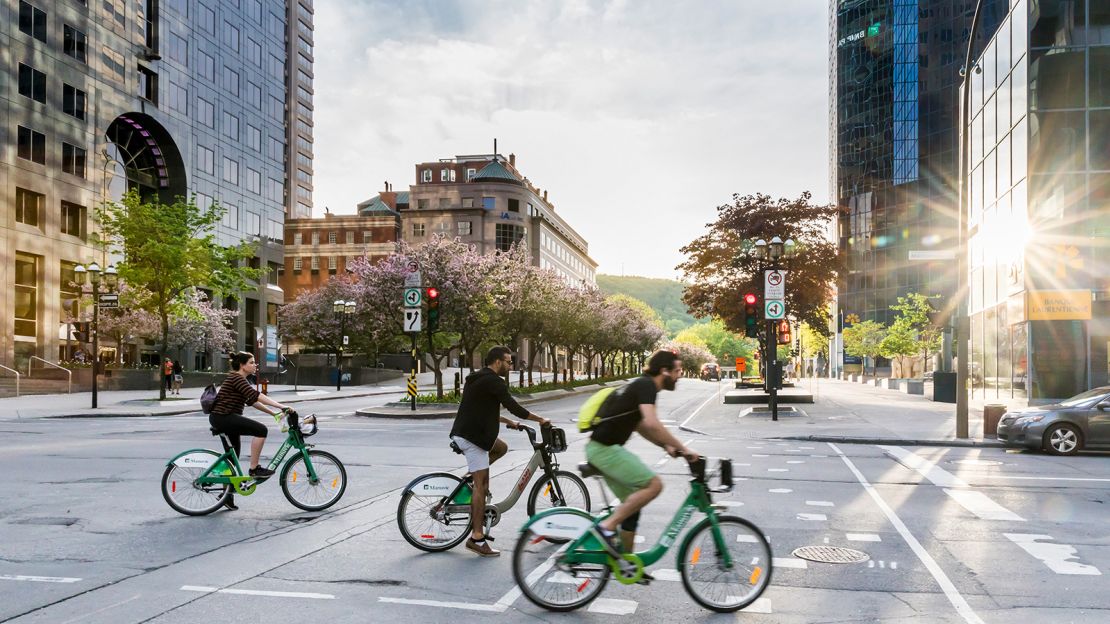
This bilingual city, set on an island in the St. Lawrence River, has embraced bicycles in a big way.
Since the 1980s, Montreal has invested in bike infrastructure with hundreds of kilometers of paths and lanes, according to urban bicycle advocacy group Copenhagenize.
Now, the city plans to expand, according to the CBC, by adding about 200 kilometers (125 miles) of protected, dedicated bike lanes over the next five years.
Visitors can already bike between six of Montreal’s favorite parks: The famous Mount Royal as well as Parc Frédéric-Back, Parc Jarry, Parc Jean-Drapeau, Parc Maisonneuve and ?le-de-la-Visitation in the Prairies River.
More options: The Lachine Canal route (about 40 kilometers or 25 miles roundtrip) goes through some of Montreal’s hippest ‘hoods. The Réseau Express Vélo (REV) provides fast cycling across some of the city’s busiest neighborhoods without facing any car traffic.
Click here for some other great sightseeing routes.
Most paths are open in the city’s challenging winters, but portions might be blocked waiting for snow removal. The citywide BIXI bike rental program opens back up in the spring.
San Francisco, California
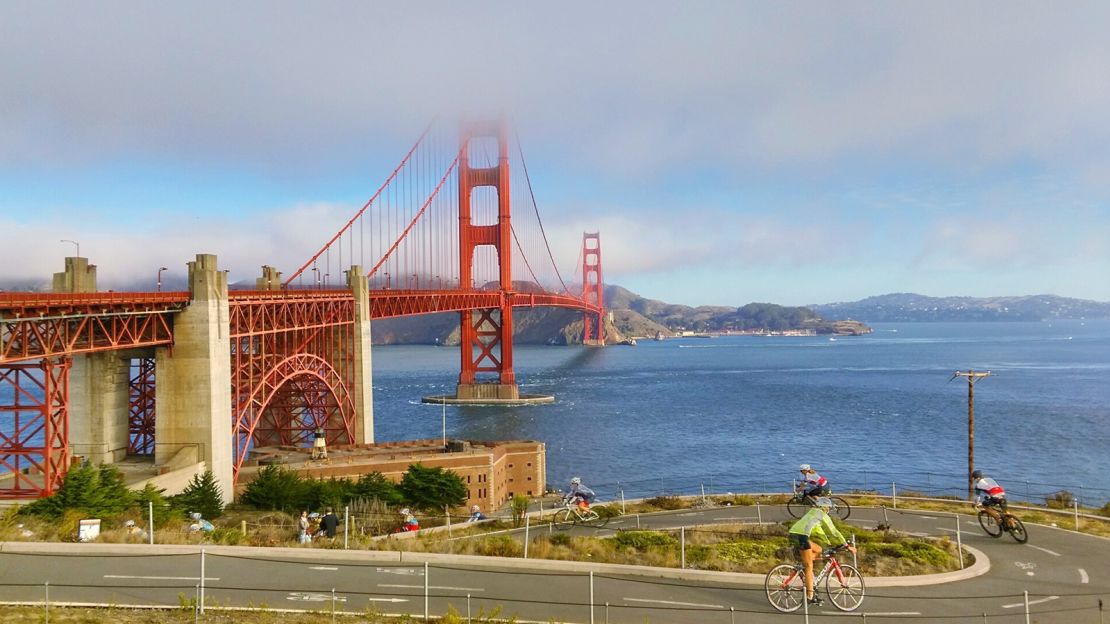
Many of the top bicycling cities are in Europe, but the United States does have some offerings, including tourist favorite San Francisco.
The city had almost 464 miles (747 kilometers) in its bikeway network as of May 2022. And 121 miles (195 kilometers) were protected.
CNN Travel emailed Nesrine Majzoub, director of marketing and communications for the San Francisco Bicycle Coalition, for some bike-riding tips in the notoriously hilly city.
“Thankfully, our bike paths choose the safest path with the least amount of hills. So, it’s really valuable to look at the ‘biking’ route in your GPS and map options, because those paths will allow you to avoid the hills as much as possible,” said Majzoub.
“For example, if you’re downtown and want to bike west towards the Panhandle and Golden Gate Park, you can take what we call ‘The Wiggle’ – a bike path that will wiggle you around the hills and have a much more accessible slope,” she said. Click here for more bike route suggestions.
Another option: renting an e-bike. “Take it as slow as you want and enjoy the ride, Majzoub said.
If you’re tired, you can also place your bike on a rack of a Muni bus. Find out public transit details here.
If you want a memorable challenge, click here to find out about riding the Golden Gate Bridge.
Strasbourg, France
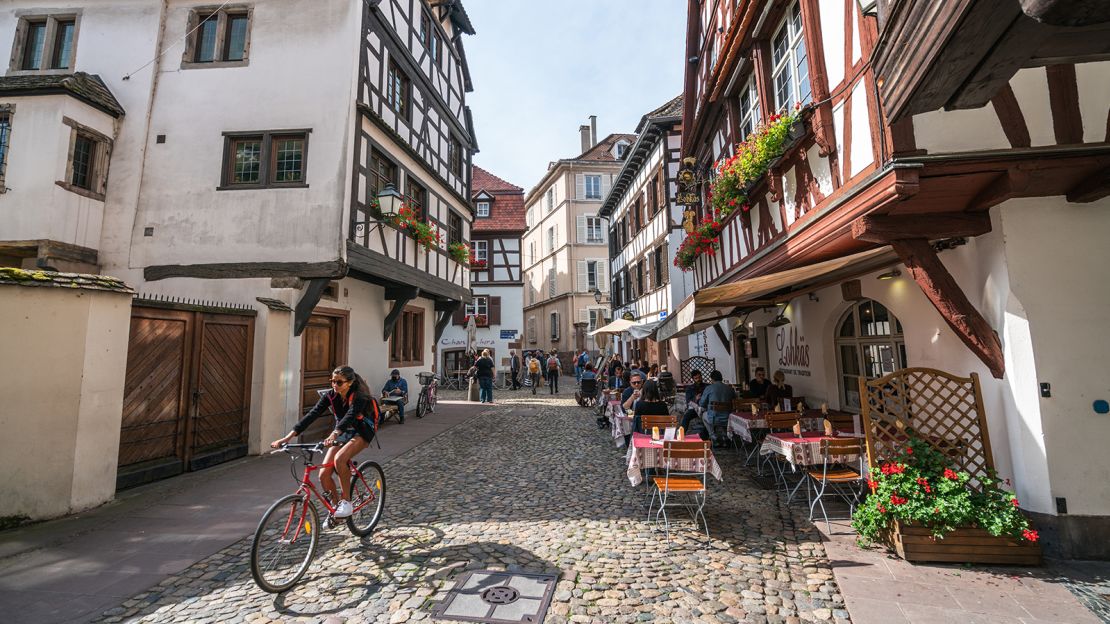
Numerous German cities are well-regarded for their biking culture, so perhaps it’s no surprise that the “French Cycling Capital” is the city of Strasbourg, which sits just across the Rhine River from Germany and has a heavy Teutonic influence.
With a metro population of about 480,000 people, Strasbourg sports around 600 kilometers (375 miles) of bike paths, according to the Office de Tourisme Strasbourg. An estimated 16% of workers use bicycles to get to work. And tourists can get in on the action.
At least 6,000 bikes are available at self-service stations 24/7. Vélhop is the major bike-sharing service in the city, offering conventional bikes, kids’ bikes, tandems, e-bikes and electric cargo bikes.
The route planning and navigation app Komoot suggests a 19.3-kilometer (12-mile) route through the heart of Strasbourg that’s rated as “easy” and takes about an hour. It winds through the Petite-France neighborhood situated along the city’s canals, where Instagram-worthy half-timbered homes still stand.
Strasbourg is so steeped in biking that hotels such as the Best Western Plus Monopole Métropole have webpages and staff devoted specifically to people who wish to bike while visiting.
Tel Aviv, Israel
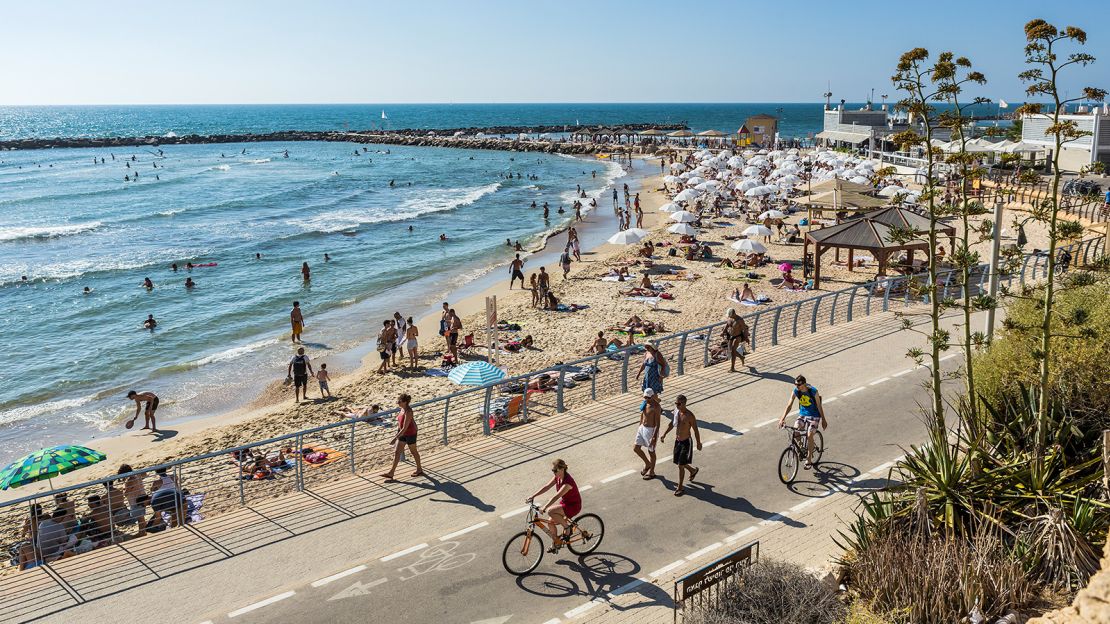
Israel’s sophisticated, Bauhaus-styled city on the Mediterranean Sea has the makings of a bicycling paradise.
It already features flat topography like Copenhagen but offers warmer, sunnier weather. And the city government has an ever-increasing commitment to cultivating a world-class bicycling culture.
The city touts the time-savings that biking can give visitors. For instance, a ride from Rabin Square, the main plaza in Tel Aviv, to lush HaYarkon Park is about seven minutes away. Popular Gordon Beach is also a short bike ride away.
Shady, cafe-lined Rothschild Boulevard, which cuts through the gleaming buildings of the White City, makes for excellent biking.
Tel-O-Fun offers rental options throughout the city via an app.
Helmets are not mandatory in Tel Aviv, according to Tourist Israel, but more locals are starting to wear them.
Utrecht, Netherlands
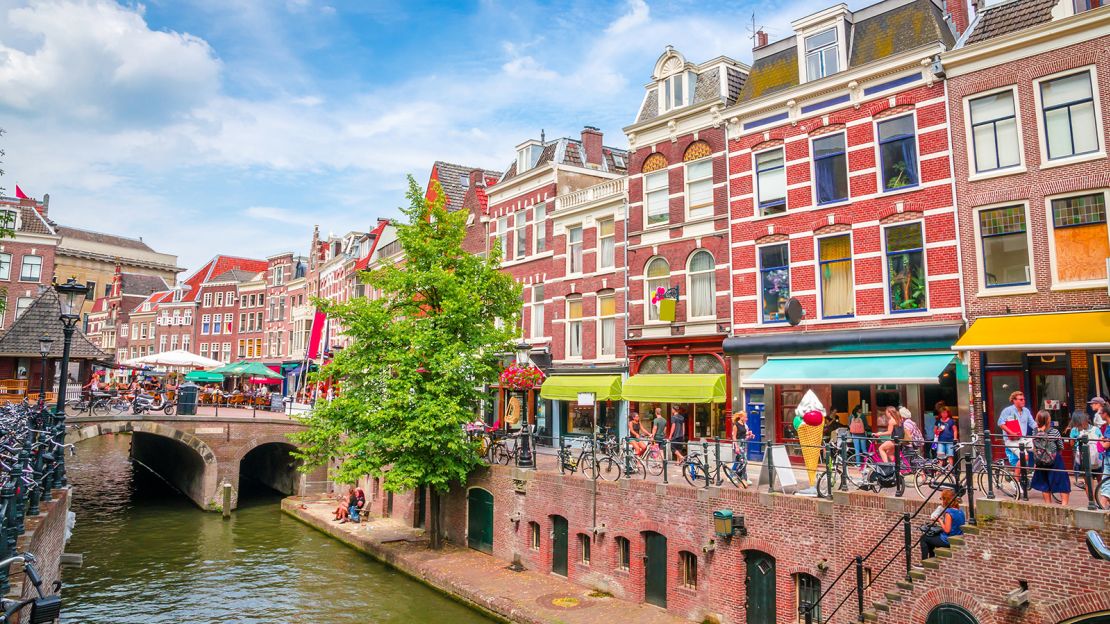
Amsterdam is justifiably well-regarded for its biking culture and tourism appeal – to the point the city now discourages overtourism. That’s where Utrecht, the fourth-largest city in the Netherlands, comes riding to the rescue.
It’s achieved a No. 1 ranking on the Global Bicycle Cities Index, and it has plenty of its own parks, canals, museums and historic buildings to offer without Amsterdam-level crowds. And it’s all connected by bike paths.
The manageable city of about 362,000 people had 420 kilometers (261 miles) of bike paths in 2021. It also claims to have the world’s largest bicycle parking facility at Central Station, with room for 12,500 bikes.
The Dutch talent for ingenious design is on vivid display here.
The Dafne Schippersbrug bridge spans the Amsterdam-Rhine canal to connect the historic city center to the new district of Leidsche Rijn. But it’s no ordinary bridge. Dedicated to bicycles and pedestrians, it also integrates a primary school and a park into the design.
Click here for bike rental information.
Top image: See the colorful Copenhagen waterfront by bicycle. (Photo by nantonov/iStock Editorial/Getty Images)
